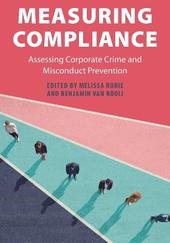
|
Measuring Compliance: Assessing Corporate Crime and Misconduct Prevention
Paperback / softback
Main Details
| Title |
Measuring Compliance: Assessing Corporate Crime and Misconduct Prevention
|
| Authors and Contributors |
Edited by Melissa Rorie
|
|
Edited by Benjamin van Rooij
|
| Physical Properties |
| Format:Paperback / softback | | Pages:324 | | Dimensions(mm): Height 254,Width 178 |
|
| ISBN/Barcode |
9781009280112
|
| Classifications | Dewey:346.066 |
|---|
| Audience | | Professional & Vocational | |
|---|
| Illustrations |
Worked examples or Exercises
|
|
Publishing Details |
| Publisher |
Cambridge University Press
|
| Imprint |
Cambridge University Press
|
| Publication Date |
4 August 2022 |
| Publication Country |
United Kingdom
|
Description
Compliance, or the behavioral response to legal rules, has become an important topic for academics and practitioners. A large body of work exists that describes different influences on business compliance, but a fundamental challenge remains: how to measure compliance or noncompliance behavior itself? Without proper measurement, it's impossible to evaluate existing management and regulatory enforcement practices. Measuring Compliance provides the first comprehensive overview of different approaches that are or could be used to measure compliance by business organizations. The book addresses the strengths and weaknesses of various methods and offers both academics and practitioners guidance on which measures are best for different purposes. In addition to understanding the importance of measuring compliance and its potential negative effects in a variety of contexts, readers will learn how to collect data to answer different questions in the compliance domain, and how to offer suggestions for improving compliance measurement.
Author Biography
Melissa Rorie is an Associate Professor of Criminal Justice at the University of Nevada-Las Vegas (UNLV). Her research predominantly examines the impact of formal and informal controls on corporate and white-collar offending as well as theoretical explanations for elite crime and corporate noncompliance. Benjamin van Rooij is Professor of Law and Society at the Faculty of Law, University of Amsterdam and Global Professor of Law at the University of California, Irvine. His research focuses on individual differences in compliance, toxic corporate culture, and assumptions about behavioral change.
Reviews'Few subjects are as critical as the fairness and reliability of regulatory compliance to securing the legitimacy of democratic governance. Measuring Compliance tackles the too often overlooked yet fundamental challenge of addressing corporate crime that systematically undermines citizens' confidence in government. Here is a collection of cutting-edge research, offering a handbook of essential methods for identifying and promoting more consistent regulatory compliance in the too illusive phenomena of corporate misbehavior. The editors have provided not only a welcome set of tools but a marvelous read as well.' Susan Silbey, Leon and Anne Goldberg Professor of Sociology and Anthropology; Behavioral and Policy Sciences, MIT Sloan School of Management, M.I.T. 'Anyone who considers measuring corporate compliance should read this book first: it offers an accessible and state-of-the-art treasure trove of concepts, methods and ideas for measuring compliance successfully.' Muel Kaptein, Professor in Business Ethics, Erasmus University Rotterdam 'Reducing the amount of harm that corporations impose on society has proved to be a challenging task for everyone concerned. This important book on measuring corporate compliance provides researchers, prosecutors, regulators and policy makers with an arsenal of strategies and techniques to assess the effectiveness of corporate compliance programs and thereby reduce corporate misbehavior while promoting responsible corporate governance' Michael L. Benson, Professor Emeritus and Senior Research Associate, School of Criminal Justice, University of Cincinnati 'Melissa Rorie and Benjamin van Rooij have edited a must-read primer for anyone interested in compliance management systems. It is a call and a platform for better understanding of compliance and its measurement in the context of cooperate crime and misconduct prevention.' David Levi-Faur, Professor in Political Science, Hebrew University, founding editor of Regulation & Governance
|